With the current barrage of media headlines about mortgage stress, rental accommodation shortages, job layoffs, long waits for urgent healthcare appointments, and people with mental health concerns being turned away from care, it’s heartbreaking but not surprising that many of our members are reporting feeling stressed, and are having trouble coping with everyday tasks.
An alarming 50 per cent of the 7,118 respondents to our in-app Sonder Wellbeing Assessment in the period 1 October to 31 December 2022 reported having trouble coping with everyday tasks several times a week.
In the same period, 76 per cent of respondents had trouble coping at least once in the prior 30 days. This means many people may not be well.
But, whilst stress can impact wellbeing, work performance, and the ability to cope, do all employees self-reporting stress need a psychologist?
What do we mean by stress?
Stress is a common and normal physical response to challenging or new situations. It is the body’s response to anything that requires urgent attention or action and can be defined as any type of change that causes physical, emotional, or psychological strain.
Stress in the form of a mild challenge can be beneficial as it provides the brain and body with a chance to practice their adaptive response in preparation for future challenges.
There are two main types of stress, as defined by duration and intensity:
- Acute stress activates the fight-or-flight response of the sympathetic nervous system but lasts for a short period of time.
- Chronic stress is characterised by long-term exposure to stressors, resulting in persistent activation of the body’s stress response.
References: Healthdirect Australia, World Health Organization, The Australian Psychological Society, Britannica
“The way an individual responds to stress is directly influenced by the situation they are in at that time. It is essential that the complete picture is considered when making a decision about the best path to support and the need for treatment.”
Dr Jamie Phillips, MB ChB, AFCHSM, DIMC, RCS(Edin), MRCGP(UK), FACRRM(EM)
Medical Director, Sonder
The impact of stress on work performance and wellbeing
In our annual Workforce Survey (October 2022) of 2,000 employees working a minimum of 20 hours per week, we found:
- A high 92.3 per cent of surveyed employees who experienced stress said it impacted their work performance – with 29 per cent reporting it had a large impact on their work performance.
- Nearly half of the respondents reported they had experienced stress more than five times in the previous 12 months – with only seven per cent not experiencing stress at all.
However, an analysis of the responses showed that personal wellbeing was only impacted when the employees were exposed to frequent stress.
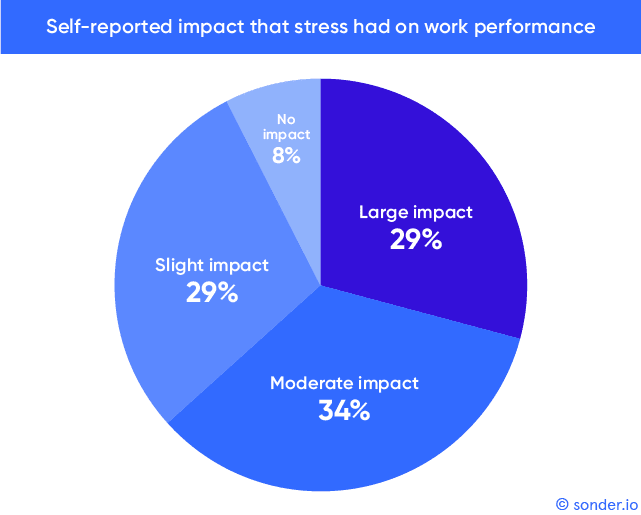
Industry breakdown
When broken down by industry, workers in the education and training industry perceived that stress impacted their work performance more than in any other industry in our survey.
Conversely, workers in the professional, scientific, and technical services industry perceived that stress impacted their work performance less than any other industry in our survey.
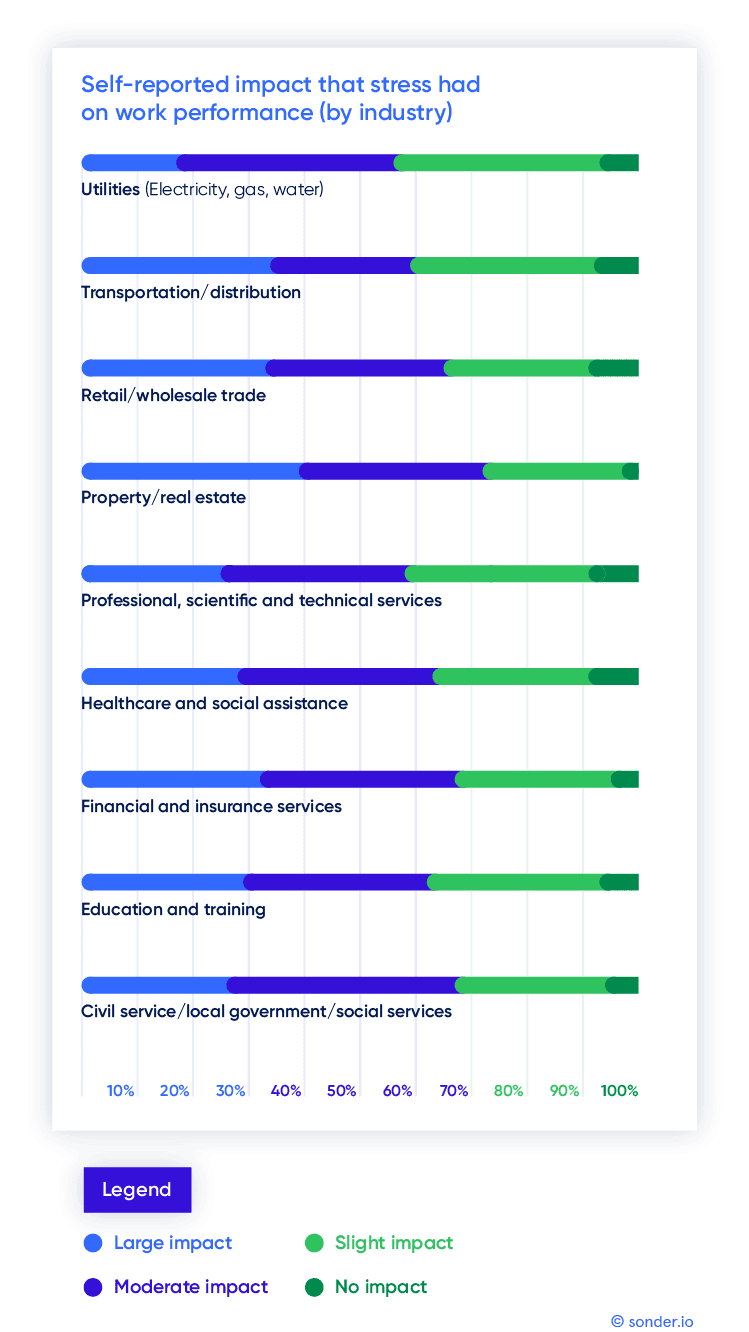
Do all employees self-reporting stress need a psychologist?
After analysis of 10,000+ active member support cases from October to December 2022, we found a significant 77 per cent of members who self-reported they were feeling stressed did not (after our clinical assessment) require formal mental health treatment by a psychologist.

Working within a stepped care model, our qualified clinical team was able to provide immediate, right-fit assistance – to help people when, where, and how they needed it – empowering them to take active control of their wellbeing without delay.
In our follow-up survey of members who were recommended for facilitated self-care, 84 per cent reported that they were satisfied with that level of support and did not require further assistance. Members who were not satisfied were followed-up (if consent to follow-up had been obtained) to ensure they received the right level of further support.
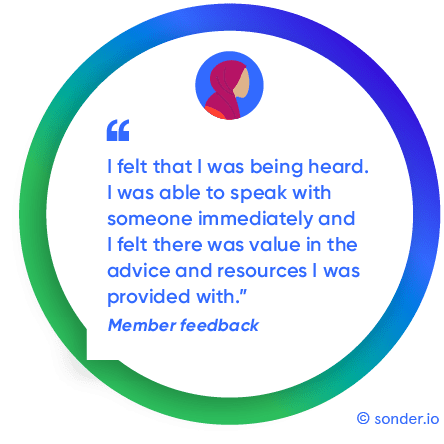
What is a clinical assessment?
A clinical assessment is a professional assessment made by a qualified health clinician to decide the next best steps for an individual’s care plan.
At Sonder, our team conducts these at the very start of a member’s care journey. Having this assessment upfront is important because it helps members who don’t need a psychologist (because they can benefit immediately from guided self-management) as well as members who would benefit from formal psychological support (by rapidly identifying and matching them to the best psychologist for their needs).
What is stepped care?
Stepped care is an evidence-based, staged system of care. It comprises a hierarchy of interventions, from the least to the most intensive, to help match an individual’s needs to the most appropriate level of care.
Each type and level of stepped care is not mutually exclusive. In our holistic wellbeing model, we recognise that an individual’s wellbeing support needs are often complex, and most members are contending with multiple, intertwined challenges.
This means they might be connected to any combination of stepped care types and levels at the same or different times for each of their unique concerns, to achieve their best overall outcome.
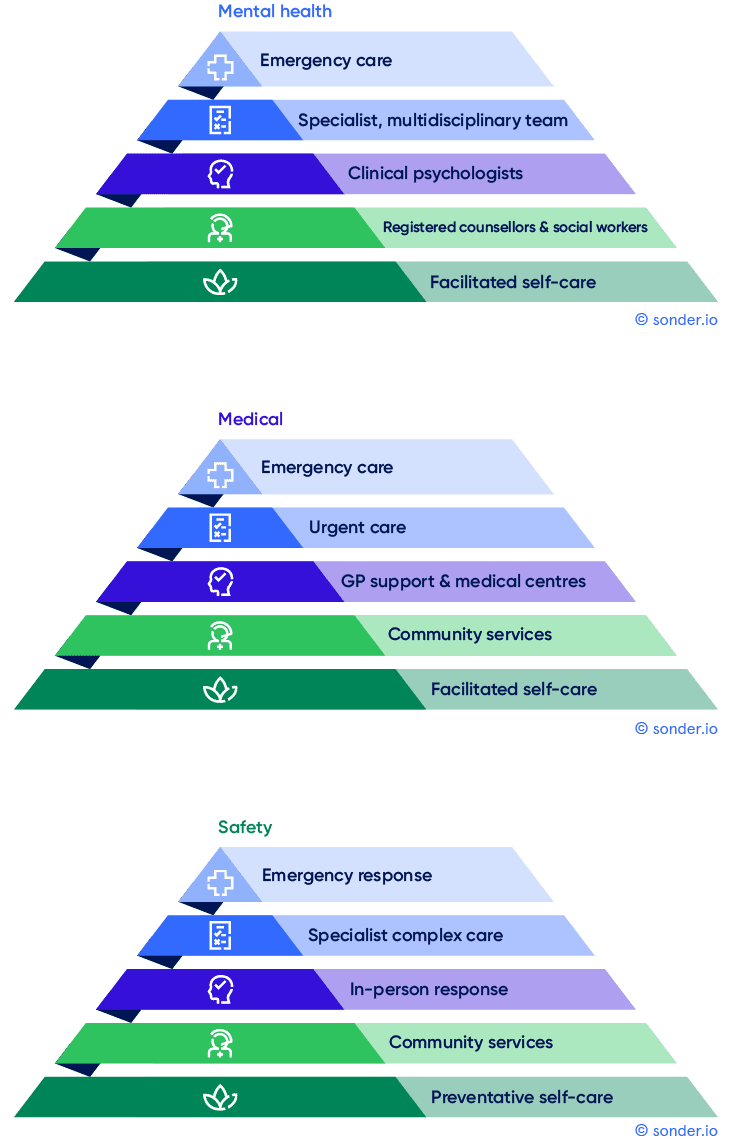
What does this wellbeing data mean for your organisation?
Stress is certainly not new to the world of work or indeed the human condition. A healthy amount of stress can drive us and help us respond to difficult challenges, but as these latest findings reveal, heightened, chronic stress can have a debilitating effect on our ability to cope – even with the everyday.
While it’s been encouraging to see so many members actively seek support and benefit from interventions that have met them where they’re at, we need to catch people upstream before chronic stress sets in. As business leaders, we need to ensure that our workplace, and the cultures we shape, control for not contribute to excessive or unnecessary pressure.
This data reminds us of the importance of maintaining efforts to help employees build sustainable and robust coping strategies. It also reiterates the need to build a culture of Active Care – where employees and employers share the responsibility for wellbeing.
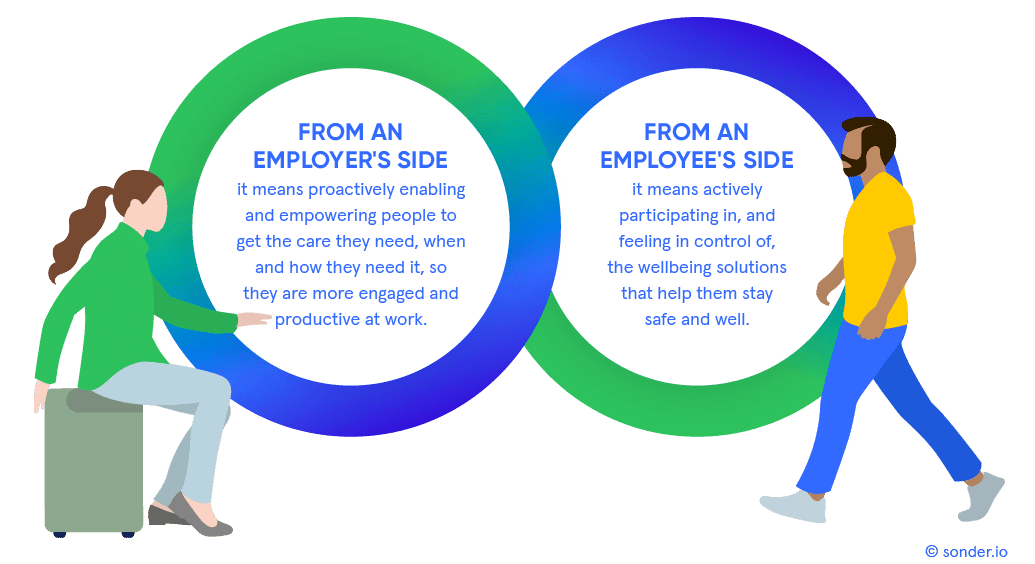
Next steps for HR/P&C leaders
Based on the wellbeing trends discussed, here are some suggested next steps for HR/P&C leaders who want to make a meaningful difference to the wellbeing of their people:
- Reframe stress. Leaders can build their team’s awareness around the dynamic, individual nature of stress, and its relationship to wellbeing and performance. Individuals who learn to identify their unique stress triggers can better isolate the ones that can be harnessed to optimise their performance, versus those stressors that are overwhelming and need to be proactively managed.
- Catch people upstream. Leaders are often the first to see signs of heightened stress and are in a powerful position to address stressors that emerge on the job (e.g. an unachievable deadline, growing uncertainty, and broken processes or systems). Leaders need to create a psychologically safe space for stress levels to be discussed and encourage team members to tackle issues early before they have a detrimental impact on their physical and mental health.
- Review your existing EAP offering. Ask your current provider if they use qualified health clinicians to triage people upfront in a stepped care model before they book them into a psychology appointment they might not need. This will help your people receive the most appropriate and timely care that best fits their circumstances. It might also reduce any unnecessary organisational expenses.
- Address the ‘busyness paradox’. In nearly every organisation, there are pockets where chronic stress appears to be a collective and systemic phenomenon. This often happens in departments, teams, and locations where subcultures of ‘busyness’ have been reinforced over many years, and where working at a relentless, frenetic pace is equated with success and value. Taking bold action to reset values and priorities in these areas is key to managing work-related stress at scale.
About Sonder
Sonder is a technology company that helps organisations improve the wellbeing of their people so they perform at their best. Our mobile app provides immediate, 24/7 support from a team of safety, medical, and mental health professionals – plus onsite help for time-sensitive scenarios. Accredited by the Australian Council on Healthcare Standards (ACHS), our platform gives leaders the insights they need to act on tomorrow’s wellbeing challenges today.



